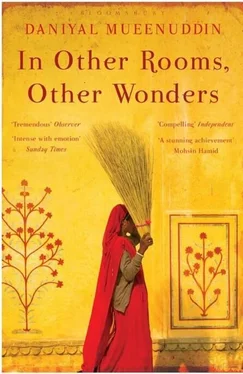I retreated into my chambers, in order not to seem impatient. Half an hour later I called him in.
‘Mian Sarkar,’ I began, ‘would you be so kind as to explain the situation in … what was the name of the village?’
‘Parian, sir.’ Putting his hands on his knees, which he held clamped together, he cleared his throat. He has a habit of sitting always at the edge of his seat, as if at any moment prepared to spring up. ‘To be brief, sir, the deceased did not commit suicide. She was killed. The boy, however, is not the murderer, although he was present and did not interfere.’
‘Excellent, or rather, good. And the — ’
‘The husband killed her. As always there had been trouble in the family. The old man threatened to remove his money and to retire in Islamabad. The elder brother called the younger home, in order that they might steal the money together and neither feel compelled to take the father’s side. Husbands and wives all took part in the theft. Of course I entertained no doubt that the sons had stolen the treasure and murdered the girl. Only the question of why they killed her remained. The harsh method they selected to practice upon her I left aside as immaterial.
‘The facts presented themselves as follows. The police, who had been called by the brothers merely to conduct a pro forma investigation of the theft, saw the possibility of exploiting the situation, of taking the lion’s share of the stolen goods, and began to act with unwonted energy. When the husband saw his wife breaking down under questioning, he prepared an elaborate dinner with which he lured the constables away, urging them to continue their inquiry the next morning. They acquiesced, sensing an opportunity to negotiate in private. That evening the boys decided to kill her. Not only must they silence her, they also needed a victim, someone to whom they could ascribe the theft, and who would not talk. They panicked. Criminals are fools. The husband was the prime mover. He is, sir, a nefarious fellow. A man of very poor morals.’
‘Undoubtedly.’ I paused, not wishing to seem importunate. ‘Would it be indiscreet to ask how you unraveled this, and unraveled it so quickly?’
‘Options, sir. For every lock there is a key. Take hold of your man, sir, and give him options. Contrary to popular belief, there is no honor among thieves. The elder brother quite expected young Khadim to be presented with the black warrant and to swing. He of course would thereby reap the younger brother’s share. The victim’s deathbed statement went against him, and in these inflationary times to escape murder charges is ruinously expensive. I explained to the gentleman, however, that if the unfortunate death were to be called a murder, neither you nor the generous Mr. Sohail Harouni would allow the younger brother to absorb the blame. The younger was after all the father’s favorite. Why then, I asked him rhetorically, shouldn’t the less favored one make the sacrifice? In Pakistan all things can be arranged — and surely the girl’s family could be mollified. That evening he came and laid open to me not only his heart but also his overflowing purse.’
After pausing again, in order to let this sink in, I asked, ‘And so, what is the solution?’
‘I took the liberty of making inquiries regarding the willingness of the deceased’s family to settle the case. It seems they were attached to the girl and wish to see the young man hang. They nominated him as the subject of the alleged deathbed confession because he is the most beloved of the father’s offspring. They want blood rather than gold.’
‘That looks bad.’
‘Madam most particularly desires to retain the services of the young man. I had money in hand. It happened that the Deputy Superintendent of Police and I became well acquainted, almost in fact as if we had grown up in the same village, as he rather poetically phrased it. He had informed me already of the costly treatments his aged mother was undergoing — a heartbreaking tale. His men belatedly reported that they did not distinctly hear the confession, due to the extent of the deceased’s injuries. This confession is the only evidence linking the boy to the murder.
‘I also happened to strike up a second acquaintance. A respected doctor from Abbotabad, another similarly disposed though less effusive friend, happened to be in the hospital that night, and this gentleman suddenly recalled that he had looked into the room where the woman lay. He is willing to testify that due to her burns, which covered ninety percent of her body, and which had incinerated her cheeks, her lips, her teeth, her tongue, and even her gums, there is not the remotest possibility that she could speak. Furthermore, he testifies that she would not have been in her right mind at the time.’
‘How dreadful!’ I interjected, and Mian Sarkar cast his hooded eyes upon me, as if to say, Ah! Pieties!
‘And so …’
‘Judge Aftar will preside over the case. He graduated from the Academy five years after you did. His wife is second cousin to Mrs. Arafa, Brigadier Kuloo’s niece, who came under obligation to Madam, Your Honor’s wife, at the time of Bibi Kamo’s death — you recall, I am sure, the dancing master and the emeralds. In any case, you may wish to speak with the judge.’
And that, of course, is exactly what I did.
In Other Rooms, Other Wonders
HUSNA NEEDED A a job. She stole up the long drive to the Lahore house of the retired civil servant and landlord K. K. Harouni, bearing in her lacquered fingers a letter of introduction from, of all people, his estranged first wife. The butler, knowing that Husna served the old Begum Harouni in an indefinite capacity, somewhere between maidservant and companion, did not seat her in the living room. Instead he put her in the office of the secretary, who every afternoon took down in shorthand a few pages of Mr. Harouni’s memoirs, cautiously titled Perhaps This Happened . Ushered into the living room by the secretary after a quarter of an hour, Husna gazed around her, as petitioners do, more tense than curious, taking in the worn gold brocade on the sofa, a large Chinese painting of horsemen over the rosewood mantel. Her attention was drawn to ranks of black-and-white photographs in silver frames, hunters wearing shooting caps posed with strings of birds or piles of game, several of women in saris, their hair piled high in the style of the fifties, one in riding breeches, with an oversized dedication in looping script. To the side stood a photo of a youthful Harouni in a receiving line shaking the hand of Jawaharlal Nehru.
The door opened, and Mr. Harouni walked in, a mild look on his handsome golden face. Placing a file on the table in front of him, the secretary flipped through the pages and showed the old man where to sign, murmuring, ‘Begum Sahiba has sent this young miss with a letter, sir.’
Although he had an excellent memory, and knew the lineage of all the old Lahore families, K. K. allowed Husna to explain in detail her relationship to him, which derived from his grandmother on his mother’s side. The senior branch of the family had consolidated its lands and amassed power under the British, who made use of the landowning gentry to govern. Husna’s family, a cadet branch, had not so much fallen into poverty as failed to rise. Her grandfather had owned thirty or forty shops in the Lahore Old City, but these had been sold off more than thirty years ago, before prices increased when Lahore grew in the 1950s and 1960s. Encouraged by K. K., given tea and cakes, Husna forgot herself, falling into the common, rich Punjabi of the inner city. She told with great emphasis a story about her mother, who remembered falling and breaking her teeth on the steps leading into the courtyard of a lost family home, which were tall and broad to accommodate the enormous tread of a riding elephant, emblematic of the family’s status.
Читать дальше












